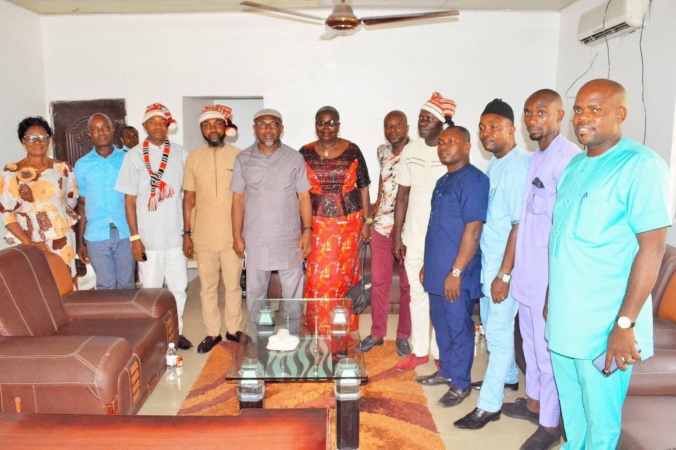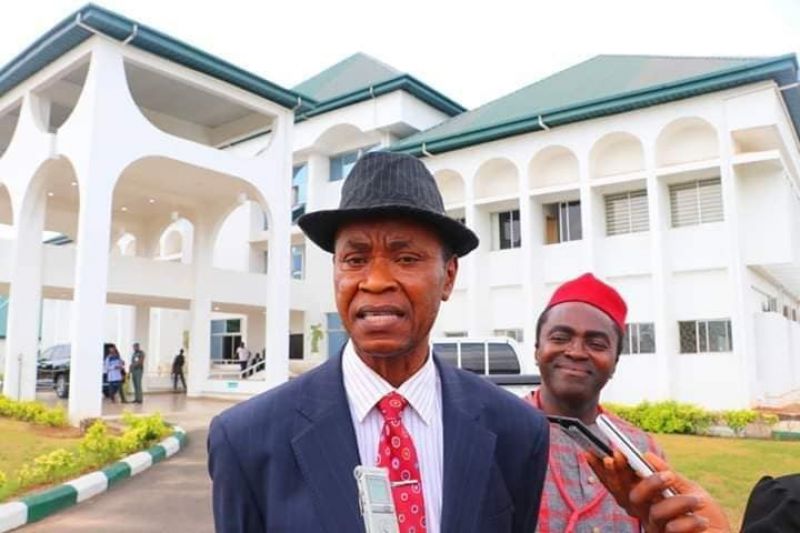Restructuring of Nigeria
Posted by Factnews | 7 years ago | 3,955 times

“We the people of the Federal Republic of Nigeria
Having firmly and solemnly resolve, to live in unity and harmony as one indivisible and indissoluble sovereign nation under God, dedicated to the promotion of inter-African solidarity, world peace, international co-operation and understanding
And to provide for a Constitution for the purpose of promoting the good government and welfare of all persons in our country, on the principles of freedom, equality and justice, and for the purpose of consolidating the unity of our people…….” The opening declaration as contained in the 1999 constitution of the Federal Republic of Nigeria.”
The above captured the reality of Nigeria and its paradox. There are fundamental words and phrases contained therein that are necessary in discussing the need or otherwise of complete restructuring of the country. These are: to live in unity and harmony, indivisible, indissoluble, promotion of good governance, welfare of all persons, freedom, equality and justice.
Ladies and Gentlemen, I do not intend to bore you with unnecessary spinning and sophistry. This is purely a nation building exercise and I am quite hopeful that your time will not be wasted reading this. I am also expectant of your well intentioned views on the issues that will be raised here.
The words indivisible and indissoluble simply connote characteristics of a forced union. This is not helped by the fact that the departing military oligarchy unilaterally imposed the constitution on all of us. I am of the opinion that an article of perpetual union signed by the elected representatives of all the federating units in a constitutional conference would have sufficed and given the people the confidence that they made a choice to be citizens of the federal republic. You may probably ask the question, to what end? In nation building and democratic governance, the orientation of the people on matters relating to citizenship and nationality is a psychic energy that has dual capacity to either build or destroy.
My vision of a restructured Nigeria is simply a return to the 1963 Republican Constitution. Another important question is: what structural wonders are contained in the 1963 constitution that are lacking in the 1999 constitution? First, I must admit that any form of restructuring must deliver a far better governance and economic result to Nigerians. A revert to the 1963 constitution will go a long way in bridging our present economic decline, disunity and leadership failure.
Unfortunately, most Nigerians misconstrue restructuring as merely altering the revenue sharing from the federation account. In reality, restructuring is the total overhaul of present governance system that has produced unimaginable poverty, made the citizens lazy and only create wealth for politicians and their cronies. The alteration of revenue sharing formula is just a means to positive end of economic development and unity.
A lot of Nigerians have posited that our problem is leadership and not deficient structures. Such assertion has no basis to justify it. We have practiced this unitary form of federalism since 1966 and the country has gotten worse year after year. No government since 1966 has moved this country forward. Those with alternate view on this should provide empirical evidence. On the contrary, Nigeria and the regions were on steady economic growth before the unfortunate coup of January 15th, 1966 stopped the momentum.
The magic that worked for pre 1966 leaders was the federal constitution that was adopted which metamorphosed into the Republican Constitution. Derivation is the bedrock of federalism. It is that potent energizer that catapults the hard working components into positive economic reference points. A functional structure straightens leaders and engenders quality leadership. On the contrary, impaired structure emboldens disastrous leaders and limits the capacity qualified leaders to deliver.
Ladies and Gentlemen, having done with the introductory part of this presentation, my concentration is to let our people understand that the 1963 constitution worked for us in all the federating zones of the country. Note that the intro to the 1999 constitution started with “We the people of the Federal Republic of Nigeria” and federal was not inserted there for fun.
Understanding the position of the 1963 constitution will enable and guide us in moving forward. Each time restructuring is raised, the opponents are quick to point in the direction of corruption as our major problem. They are convinced that we need to do more to fight corruption. Ask them what need to be done and you will meet a road block.
Corruption is product of the fundamental dislocation in our governance structures which restructuring will cure. Financial corruption is only a by-product of laziness, unemployment, nepotism, etc. There is another point raised by opponents of restructuring in an attempt to sustain their position that development can take place with the present structures if we have good leadership. That example is Lagos. This argument is flawed because Lagos became a metropolitan when most of today’s big cities were forest reserves and hosts to wild animals. Moreover, Lagos was our national capital for over seven decades. The fundamentals of development have been in place in the state. The truth they do not want to tell you is that Lagos will become the biggest economy in Africa if the country is positively structured. Lagos is a victim of the dubious federalism we are practicing.
Fundamental Differences between the 1963 constitution and the 1999 constitution:
-1963 operated on Parliamentary Democracy which is far cheaper to run than the Presidential System we have now. It ensures that development trickles down to the people than the present dispensation. The members of parliament are the development agents and the people can easily hold them accountable. The failure of a parliamentarian directly impacts on the political capital of the Prime Minister or the Regional (state) premier.
-1963 made a provision for 50% derivation for minerals (which includes solid minerals, hydrocarbons and Natural Gas). The 1999 constitution provided for a paltry 13% derivation for mineral resources. We need to draw a distinction between derivation and allocation to appreciate the problem we are facing. With regards to 1963, the federal government was entitled to 40% of the remaining 50% while the regions shared 60%. In simple terms, federal government received only 20% of mineral inflows and the regions shared 30%.
-1963 constitution made no allocation for the local governments and rightly so. In a federation, you have the central government and the federating units. This is different from a tier of government. The 1999 constitution allocated a whopping 20.6% of national revenue to the local governments. The result is that the funds meant for the federating units were chopped off and given to a tier of government that whose components were whimsically created by the military. This is a fundamental structural defect that restructuring will cure.
-1963 provided for consumption tax sharing of 70% derivation and 30% for the federal government and other regions. Derivation in this instance was the level of consumption by regions. The present VAT regime is not in accordance with federalism.
-1963 concurrent lists included generation, transmission and distribution of electricity. Same applies to the 1999 constitution. However, the 1999 constitution placed many barriers for the states with regards to power. It introduced the transmission through national grid and requires approval from the federal government. It only empowers the states to generate, transmit and distribute electricity only to rural areas without electricity. This is pathetic indeed. The 1963 constitution gave powers to the regions to generate electricity, transmit, distribute and regulate.
-1963 constitution provided for contributions by regions based on the import and exercise duties allocation to the region based on derivation. The contributed amount is used for the administration of the service. This is not the case with the present arrangement as contained in the 1999 constitution.
Dangers in Maintaining the Status Quo
The development of Nigeria has been hindered by the discovery of crude oil. It created billionaires at the expense of overall tangible development. This is the appropriate time to draw the line or see the irredeemable crash of the national economy. The present state of the economy will amount to an El Dorado compared to what will happen if we fail to restructure.
The fear of revenue loss by some states is not well situated. Only the federal government will in reality have a reduced allocation in a restructured Nigeria. This reduction in allocation will ultimately reduce the powers of the central government and make it less attractive. The direct consequence will be less focus on Abuja and more on the states. This will engender peace, unity and mutual cooperation.
The economy will be the greatest beneficiary of a restructured Nigeria. Of what use is the monthly
Sharing of funds in Abuja just to pay salaries (when they wish to pay) and recurrent expenditures of the states? Today, only Lagos can cope without the monthly allocations from Abuja. However, a restructured Nigeria based on the 1963 constitution will ensure that at least 30 of the 36 states are economically viable in less than 10 years. A direct implication will be that states like Ebony will no longer elect the likes of Umahi to solely depend on Abuja for survival.
Ladies and Gentlemen, can anybody proffer answers to why Chad is surviving as a country? Why is Niger surviving? Why is Burkina Faso surviving? What of Rwanda, Benin and Togo? Why can’t Borno, Kano, Sokoto, Kwara, Imo, Cross River, Ondo and others survive without sharing money from Abuja?
The fundamental truth is that a restructured Nigeria will kick start a huge agricultural revolution never seen by mankind. Yes, this will happen in Nigeria. Kano state alone can earn as much as US$10bn annually from agriculture if it is focused. A Kano state Produce Marketing Board that works in synergy with the farmers will not be mocked by anybody because of oil money. Same applies to other states in Nigeria including my state of Imo.
We must not forget that this expected agricultural revolution will lead to industrial revolution. Many agro based industries will naturally arise to process the output from the farms. Critically, thousands of jobs will be created to employ young Nigerians. This will ultimately help in reducing crime and other social ills. In essence, restructuring is a national security enhancer. It will also fasten the solid mineral rush. A win - win for everybody.
Countries that fail to plan, plan to fail and this is a scenario we must avoid. The relevance of crude oil will progressively be on the decline. Recently, the government of France declared that by 2040, there will no petrol or diesel powered vehicles on its streets. That is just 32 years and 6 months from now. Let us not forget that this is in compliance with the France Agreement on Environment (global warming). Definitely, other countries will follow their example. How prepared are we for this great challenge? Only a restructured Nigeria will prepare us and nothing more. Note: the Formula E Motor Race is designed to replace Formula One in the future. What they are showcasing is the power of non-fossil powered automobiles.
The present structure that blinded the leaders in Taraba state from understanding that it is potentially the richest state in Nigeria will continue to impoverish the masses and empower looters of the treasury. There is no need for any part of the country to be afraid of restructuring. It will ensure that state governors avoid appointing hundreds of aides at the expense of their lean finance. All state government workers must not be paid equally. Why must a Lagos civil servant earn same salary as an Ekiti worker in similar capacity? That’s not in the spirit of fiscal federalism. Fiscal federalism will force a Gov. Yahaya Bello of Kogi state to do his best to ensure Lagos state is not permanently in the sky. He can at least defy gravity and bridge the altitude. Only a restructured Nigeria will give him that opportunity.
Roadmap to Fiscal Restructuring of Nigeria
-The only route to restructuring is strict adherence to the provisions of the 1999 constitution. It could be through a constitutional amendment process initiated by the President or a National Conference backed by an Act of parliament. A sovereign Conference is not a solution but a highway to anarchy. We have entrusted our sovereignty already to the President and the National Assembly. The Jonathan’s conference was not representative of the entire political spectrum of Nigeria. My position on this is that constitutional amendment process through NASS will be cheaper, precise and also engender clarity in objective accomplishment.
-Restructuring must be a gradual process that is designed to ensure stability of the polity, peaceful coexistence and economic development that is mutually beneficial to all the federating units.
-The benchmark for revenue allocation should be 33% derivation, 47% for the states to be shared based on the current criteria and 20% for the federal government.
-Based on the need to avoid destabilization of the governance and to enable the federal government to thoroughly prepare the public service for the new dispensation, I suggest the following schedule in reducing its allocation:
1.Maintain the present allocation till 2020.
2.Retain 40% allocation between 2020 – 2025
3.Retain 30% allocation between 2025 – 2035
4.Retain 25% of allocation between 2035 – 2045
5.Permanently retain 20% of allocation from 2045
-Based on the need to prepare the states for economic sustainability as witnessed during the First Republic, I suggest the following schedule in increasing derivation:
1.Maintain status quo until 2025
2.Increase derivation to 20% between 2025 – 2035
3.Increase derivation to 25% between 2035 – 2040
4.Increase derivation to 30% between 2040 – 2045
5.Permanent derivation at 33% from 2045
-Based on the need for equity in the states, all revenue generating local government areas shall be entitled to the operating percentage of derivation from their state governments. This is based on the calibration as stated above. Example: All the oil producing local government areas in Delta state shall be entitled to 33% (if the derivation regime is 33%) of oil derivation and this must be shared based on production levels.
-All mineral producing communities shall be entitled to 33% of derivation to local government areas. The same conditions are applicable in the relationship between the states and local governments.
-VAT proceeds should from 2019 be based on 70% derivation and 30% for the federal government
Important pre implementation Agreements:
-All federating unites shall sign an article of perpetual union prior to the implementation of the restructured parameters.
--The restructured system shall remain irrevocable notwithstanding the political status of the country.
-The transitional timeline of 25 years shall not entertain any form amendment either directly or indirectly.
Ladies and Gentlemen, I have no doubt that a focused restructuring process can take place within 25 years. Citizens of each state of the federation will have the incentive to make their state great.
Kelechi Jeff Eme
Mbieri, Mbaitoli,
Imo State.
Readers Comments
comment(s)
No comments yet. Be the first to post comment.








